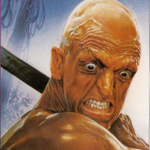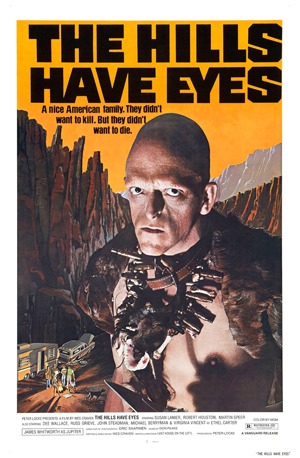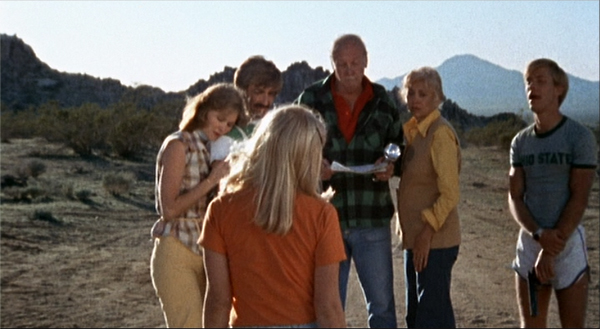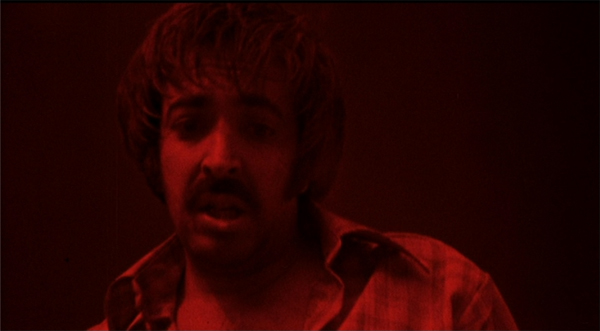 THE HILLS HAVE EYES is not my favorite Wes Craven movie, but in a certain sense it’s one of his purest. It has that LAST HOUSE ON THE LEFT maniac-college-professor vibe – another raw, seedy gut-punch of a drive-in movie layered with completely sincere themes and social commentary. And it’s a little more fantastical than LAST HOUSE, with less straight up degradation, so I don’t feel as ashamed for liking it.
THE HILLS HAVE EYES is not my favorite Wes Craven movie, but in a certain sense it’s one of his purest. It has that LAST HOUSE ON THE LEFT maniac-college-professor vibe – another raw, seedy gut-punch of a drive-in movie layered with completely sincere themes and social commentary. And it’s a little more fantastical than LAST HOUSE, with less straight up degradation, so I don’t feel as ashamed for liking it.
Instead of a gang of criminals we have a literal tribe of modern primitives – the wicked spawn of Papa Jupiter (James Whitworth, THE CANDY SNATCHERS), born “40 pounds and hairy as a monkey” in Nevada, mutated by nuclear tests and the nearby Air Force gunnery range, grew to adult size too fast, burned down his parents’ home, his dad split his face open with a tire iron and left him in the desert to die, but he survived in the hills and kidnapped some poor prostitute (Cordy Clark) “to raise a passel of wild kids” with. They wear animal parts and pieces of junk as trophies, and like the buzzards in the sky they stay above, keeping watch below, waiting to see what the highway brings them.
And today it brings them a trailer-towing-station-wagon full of middle America – three generations of the Carter family of Ohio. On the menu today are macho ex-Cincinatti-homicide-detective Big Bob (Russ Grieve, FOXY BROWN), his timid wife Ethel (Virginia Vincent, THE RETURN OF DRACULA, LOVE WITH THE PROPER STRANGER), their kids Bobby (Robert Houston, “director” of SHOGUN ASSASSIN), Brenda (Susan Lanier, “Miss Dazzle” on four episodes of Electra Woman and Dyna Girl) and Lynne (Dee Wallace, who had only done THE STEPFORD WIVES and a few TV episodes), Lynne’s husband Doug (Martin Speer, “ENGINEER / Lazaar Hannibal,” The Partridge Family), plus Lynne and Doug’s baby, their parakeet, and their two German shepherds, Beauty and Beast. The latter once killed a poodle and ”Never barks until he’s ready for the kill – he likes to have his victims unaware,” so he’ll fit right in around here.
 If this is a Haves vs. Have-Nots situation the Carter’s have gotta be the Haves, but they Want too. The “movie stars and fancy cars” of L.A. are the greener grass they aspire to, and they’re on their way for a visit. I think Brenda’s Coca-Cola and references to cheeseburgers and french fries are Craven’s shorthand for the contemporary care-free American consumerist existence or some shit – these kids and their orange surfing t-shirts, all they care about is fast food.
If this is a Haves vs. Have-Nots situation the Carter’s have gotta be the Haves, but they Want too. The “movie stars and fancy cars” of L.A. are the greener grass they aspire to, and they’re on their way for a visit. I think Brenda’s Coca-Cola and references to cheeseburgers and french fries are Craven’s shorthand for the contemporary care-free American consumerist existence or some shit – these kids and their orange surfing t-shirts, all they care about is fast food.
Not that the youth are to blame in this one. Bob and Ethel are celebrating their silver anniversary, and trying to find a silver mine the family maybe owns. When old Fred (John Steadman, EMPEROR OF THE NORTH, THE LONGEST YARD) of the ramshackle Fred’s Oasis gas station warns them of some (not all) of the dangers of going there, Bob not only ignores the advice but suspects Fred of trying to cover up having stolen from the mine. The gall of this motherfucker.
Maybe the elder Carters look down on country folk, but they don’t have a positive attitude toward urban life either. Ethel blames New York City for Lynne’s (gasp) occasional cursing. From Bob’s talk about his policing days “in the worst god damn precinct in Cleveland,” we can infer that he’s not the great hero he and his family think he is. Let’s just say he has some racial attitudes in common with Mark Fuhrman. Despite his tough talk, he doesn’t know what the fuck to do out in nature. A low-flying jet freaks him out while driving, but it’s specifically a rabbit in the middle of the road that causes him to crash and break an axel, stranding them. A god damn rabbit.
But Big City Lynne handles a tarantula in the trailer way better than I would, and never even tells anybody it happened.

As the men rally to try to deal with their situation they perfectly represent certain dated but very familiar forms of masculinity and gender expectations. Big Bob holds a map and a flashlight as he lays out the plan. Doug, looking like the prototypical late ‘70s / early ‘80s uncle or mom’s boyfriend, comforts his wife. Ethel asks for a prayer. Brenda is told “You stay close to the trailer and don’t bust Bobby’s chops. He is in charge.” Bobby stands proud in his dorky short shorts, holding a gun. I think it’s how much that little shit likes himself that makes me hate him.
One way to know you’re in trouble is when you have dogs named Beauty and Beast, and Beauty is savagely killed almost immediately. (It would also work if they were named Love & Hate, Good & Evil or Civilization & Barbarism.) Another sign is when you’re stranded and you have to walk miles in the dark to the nearest gas station and when you get there the guy you were gonna ask for help is trying to hang himself. Big Bob takes it in stride, though, saying “Get your stupid neck out of that belt, ya jackass.”
That’s kind of a hint of how extravagantly brutal things will get starting just a few minutes later. Jupiter’s boys nail Big Bob to a tree and fire bomb him as a distraction while they go into the trailer, drink the parakeet’s blood and steal the baby. Doug takes charge and tells Lynne to get the blankets and the whiskey while dumbass Bobby insists on taking the gun to “get those bastards.” In the absence of Big Bob, the younger men think it’s their duty to take charge to protect the women, which actually leaves the women unprotected. Back at the trailer Brenda gets a stab in, but mostly screams hysterically and gets off with a warning (“I’ll come back for you later, girly.”)
The character Mercury (“Arthur King,” a.k.a. producer Peter Locke) has the goofiest part: in excitement over their acquisition of a human baby he giggles over the walkie talkie, “Maybe I’ll make a joke like last time and eat the toes. You think everybody laugh?” The bizarre, literally and figuratively inbred behavior of this family, the cannibalism and the dark humor of their conversations (not to mention associated gas station) obviously bring to mind THE TEXAS CHAIN SAW MASSACRE. Not insignificantly they share art director Robert Burns, who was brilliant at assembling animal parts and junk into inscrutable visions of Hell on earth.
Our time alone with the hill people is kept minimal enough not to ruin their mystery. I’ve seen this many times and never quite remember who’s who. I think the one you actually see the most is Mars, whose curly hair definitely looks like a wig, and I like to take it as a wig he stole from some other tourist, though that’s probly not the intent. It doesn’t matter that much, but it’s weird how little Papa Jupiter lives up to his legend. Maybe he was big as a kid, but now he seems regular sized. Michael Berryman’s Pluto, of course, is the one we all remember, partly because he’s on the cover, but mostly because he has such a distinct and menacing look. I saw him in person one time and was surprised that he was smaller than me. Of course in the real world he’s just a regular guy who wears a cool leather jacket and seems really nice. But on screen and in memory he’s a nightmare come to life.
I’m sure it would be pretty easy for your average road trippers to knuckle under to these monsters. Instead, the Carters turn the tables by pulling a “when in Rome” and becoming the craziest motherfuckers in the desert. Beauty-less beasts. But it’s hard to spin it as a victory when they have to prop up their dead mother in a lawn chair to use as bait. When I think about how much I like this movie I always think about that part. Craven came up with a pretty fuckin clear line for them to cross into losing-their-humanity territory.
But it works: Jupiter gets his foot looped into some stolen military cable that they roll up onto the tire-less wheel of the station wagon. Then they lead him into the trailer, where matches under the door scrape and ignite an intentional gas leak. So I guess the people of Ohio and New York can cut it in the wild after all. Note that Pluto, like Big Bob, gets scared by a bunny. Only for a second, then he laughs, then gets eaten by Beast.
So what does this tale tell us? Does it leave any room for hope? Clearly all of humanity’s fuckin up here. I suspect Craven saw an emptiness in the middle class lifestyle of the Carters, though it’s better than being a toe-eater. The Carters may only be resentful of the military because they think overspending is raising their taxes, but this whole fuckin catastrophe in the desert stems from American militarism – testing out their nukes, and not giving a fuck about collateral damage to the environment or the locals, even on home soil. In that sense only, Jupiter is a victim, which supports some interpretations of his clan as representative of an oppressed indigenous population or an underclass, though I feel like that would be an insulting way to symbolize people.
Both families are stuck in this old patriarchal idea of the men being in charge and going out to hunt and indulge their anger and bloodlust while the women stay home with the babies. The most heroic character is Ruby (Janus Blythe, EATEN ALIVE, THE INCREDIBLE MELTING MAN), the younger sister of the Jupiter clan, who wants out. At the beginning of the movie Fred tells her she’d never be able to pass for normal, and worries that he’ll be killed just for knowing about her plan. She stays, but she follows her code instead of her dad’s when she protects the baby from her brothers and catches a rattlesnake to use as a weapon against Mars as he attacks Doug. But as soon as she does it she cries for Mars.
It’s also the younger Carters who prevail, using Brenda’s ingenious plan. I think Craven subscribed to that old optimism about things getting better when the next generation takes over. He’s certainly fond of the young people dealing with the consequences of their parents’ actions in A NIGHTMARE ON ELM STREET (who are also practitioners of booby traps).
I still wish Ruby could get her wish and start a new life in a retro-sequel called THE BEVERLY HILLS HAVE EYES. Craven actually shot an ending where her help seems to have almost earned her an honorary spot in the Carter family. It freezes on her holding hands with them – a happy ending.
But Craven chose a different ending, one that’s more upsetting, cynical, and honest. After Doug saves the day by repeatedly stabbing Mars it freezes on his disturbed face and turns blood red.

As in LAST HOUSE ON THE LEFT, civilization lowering itself to savagery is not portrayed as a triumph. If this younger generation is better they still have a ways to go. We can’t just wait for the bad guys to die or get killed if we don’t know how to be the good guys.
So I don’t know what we’re gonna do about our situation here, fellow members of civilization. If Craven left us a plan it involves dirt bikes and dog flashbacks, and I don’t really buy it. But at least he gave us something nasty to chew on, like baby toes or dog meat.
P.S. On this viewing I noticed that Bobby feels the need to talk about turkey buzzards, an early sign of Craven’s fascination with carrion-eating birds, which would culminate in a weird condor motif in his next-to-last film, MY SOUL TO TAKE.
P.P.S. On Record Store Day this year I checked to see if there were any exclusives I should look for, and I read that there was a double-LP Knight Rider soundtrack. I decided if they had that at my record store I would buy it. They didn’t, but I did find a used copy of a HILLS HAVE EYES soundtrack released in 2014. It’s lots of little tracks, mostly with numbers instead of titles, and the composer Don Peake talking over a microphone about what the cues are for. Only when I got home and was reading the liner notes did I realize the same guy scored THE HILLS HAVE EYES and Knight Rider.
P.P.P.S. If you’re reading this when I posted it, happy Halloween and thank you for being part of the most sincere pumpkin patch on the internet.


























October 31st, 2019 at 12:44 pm
One of the classics that I haven’t seen yet, but I recorded it from our cool arthouse channel last year. So maybe I’m gonna fix that whole in my movie knowledge this weekend.
Happy Halloween, everybody!